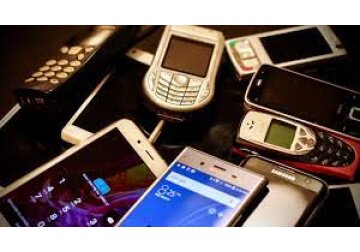
What happens when you recycle your phone? Inside the UK's biggest facility doing just that
A study last year revealed the worth of smartphones in our drawers was £1bn, while five billion handsets were thrown away worldwide in 2022. Sky News visits a recycling facility that aims to make sure no device goes to waste. "When the time comes, disconnect the main flex cable." Besides being a short guy named Tom, I never felt I had any sort of Mission: Impossible credentials until I donned safety goggles and got handed a screwdriver and plastic scalpel at what's thought to be the UK's biggest phone recycling factory. Fixing the screen on a Samsung handset isn't quite cutting wires on a nuclear bomb, admittedly, but for someone whose DIY experience doesn't go far beyond putting toppled Lego back together, it was quite the thrill. Having already used a screwdriver no fewer than 18 times to get into the device's complex interior components, the next step was removing that aforementioned flex cable. These are what connect up some of the phone's most important features, like the touchscreen, to the motherboard - and this phone needed a new one. It was a relatively basic task, though not one I was trusted with enough to perform on a real customer's device. In the time it took me to remove those screws, the technician sat in front of me had likely fixed a few of the more than 900 devices processed at the Ingram Micro Lifecycle hub in Norwich each day. The 34-year-old facility, with a floor big enough to hold 20 tennis courts, has around 800 employees. Many are highly-trained technicians, deployed at stations with dedicated equipment for everything from realigning a phone's broken camera system to replacing those all-important flex cables. Facility 'purpose built' to recycle phones Kevin Coleman, the facility's fourth employee back in 1989 and now one of its most senior leaders, says there are "hundreds of technical functions" going on at all times. "The facility is purpose built to industrialise high-volume processing of tech devices," he says. "Predominantly mobile, but also wearables, tablets, earbuds, and laptops." I even spotted a Nintendo Switch games console at one station - and it wasn't for staff to sneak in a cheeky race on Mario Kart between jobs. Of course, phones are the focus - and the range of those alone is quite extraordinary. There are shelves and trolleys stacked with iPhones, Samsung Galaxies and Google Pixels of all colours and sizes; damaged or broken in their own way; with every technician trained to handle whichever one might come to them. Old phones 'should never go to landfill' They end up with Ingram's workers via Virgin Media O2's recycle scheme, which lets people, regardless of network, submit their phone for repair or recycling. Last year, it paid out £36m to people who sold their phones - and plenty are choosing to buy second-hand. Gina Mutonono, who works on the network's sustainability initiatives, said the cost of living crisis was one of the reasons there was a "growing acceptance from customers for refurbished devices". It helps that many of the phones that go through the facility come out looking good as new - and if they're too old or just not sellable, there are likely still useful parts within. "Consumers who are sending us smashed phones don't always realise even if we cannot sell them, that they're still worth something," says Mutonono. "We can always reuse some parts, like metals or batteries - they should never go to landfill." The huge number of phones going to waste Five billion phones are estimated to have been thrown away worldwide last year, but less than 20% of e-waste is recycled and ends up part of Mutonono's cherished "circular economy". There are also thought to be tens of millions of unused electronics sitting in Britons' drawers and cupboards. A study last year revealed the estimated worth of spare smartphones alone was £1bn. To make the most of everything that ends up at the Norwich facility, new recruits go through its classroom-like training centre. Given the nature of the tech world, veterans need to return regularly as new handsets are released. They're taught how to disassemble phones and put them back together, just as I got to try - albeit with the help of a Jedi-like engineering sage at my side and a detailed set of instructions. news.sky.com







